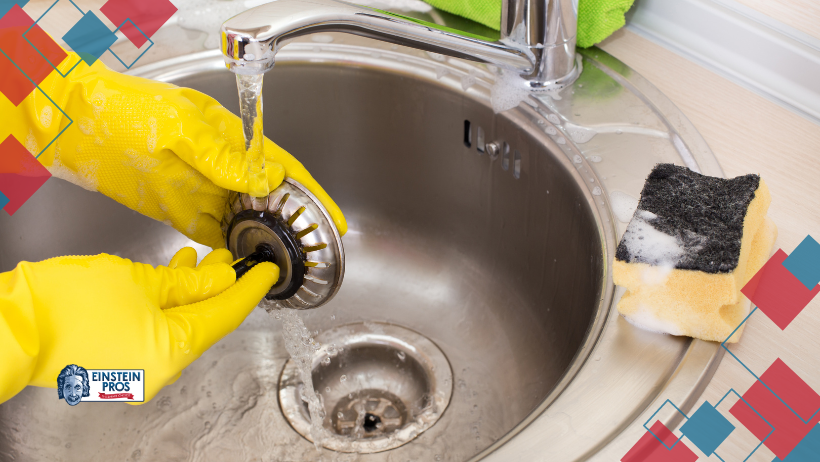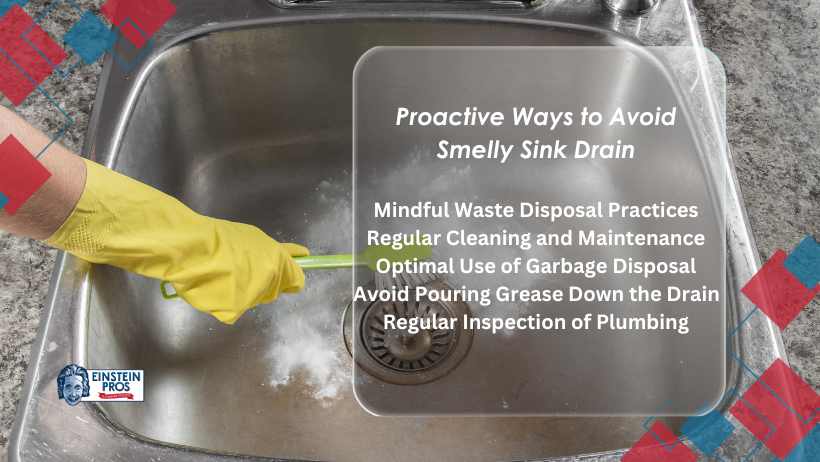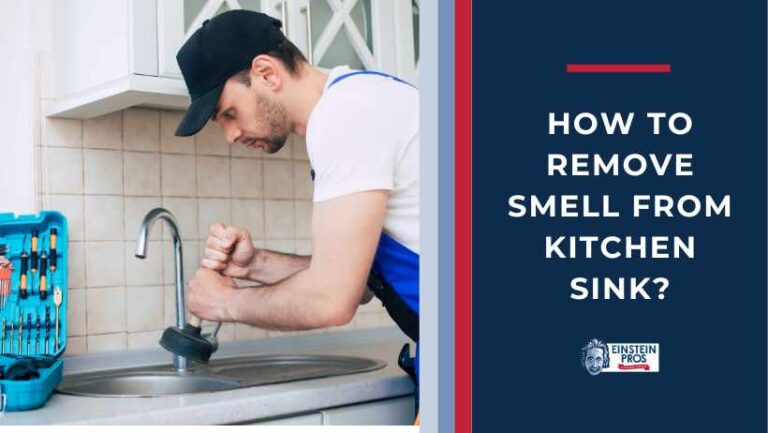The kitchen is the heart of the home, where delicious meals are prepared and memories are made. However, an unwelcome guest often lingers in the kitchen—smelly sink odors. If you’ve been battling with a smelly sink drain, it’s important to know the correct steps on how to remove smell from kitchen sink in your Seattle home. In this comprehensive guide, we’ll explore effective methods to eliminate those unpleasant odors and restore freshness to your kitchen. Say goodbye to the smelly sink blues with these tried-and-true techniques.
Factors Contributing to A Smelly Sink Drain
1. Food Residue Buildup
Leftover food particles stuck in the drain can be a breeding ground for bacteria, leading to unpleasant odors.
- Regularly scrape plates before washing to minimize food debris.
- Use a sink strainer to catch larger particles and prevent them from entering the drain.
2. Clogged or Slow-Draining Pipes
A sluggish drain can trap food, grease, and other debris, causing foul smells to permeate from the sink.
- Pour a mixture of hot water and vinegar down the drain to help break down and flush away buildup.
- Consider using a drain snake or plumber’s auger to remove stubborn clogs.
- Call for professional drain cleaning services if the slow-draining pipes persist.
3. Bacterial Growth in the P-Trap
The P-trap, a curved section of pipe beneath the sink, can harbor bacteria and emit unpleasant odors.
- Mix baking soda and vinegar, pour it down the drain, and let it sit for 15-20 minutes before rinsing with hot water.
- Remove and clean the P-trap, ensuring it’s free from debris.
4. Garbage Disposal Neglect
Garbage disposals can accumulate food particles and develop foul odors if not properly maintained.
- Grind ice cubes and citrus peels in the disposal to clean the blades and neutralize odors.
- Regularly clean the disposal by pouring a mixture of baking soda and vinegar down the drain.
5. Grease and Fat Buildup
Pouring grease down the drain can lead to a buildup in the pipes, resulting in unpleasant smells.
- Dispose of grease in a separate container, allowing it to solidify before discarding in the trash.
- Run hot water and dish soap down the drain to help break down grease residues.
6. Mold and Mildew Growth
Dark, damp environments can encourage the growth of mold and mildew, contributing to foul odors.
- Scrub the sink and surrounding areas with a mixture of water and mildew-resistant cleaner.
- Ensure proper ventilation in the kitchen to reduce moisture and inhibit mold growth.
7. Water Quality Issues
Poor water quality can contribute to unpleasant smells in the sink. Sulfur or chlorine in water may be the culprits.
- Install a water filter to improve the quality of water entering your sink.
- Run cold water for a few minutes before using hot water to reduce the presence of odorous substances.
8. Infrequent Cleaning of Dishwasher
The dishwasher, a silent contributor to kitchen odors, may harbor food particles and soap scum.
- Clean the dishwasher filter regularly to prevent food debris from accumulating and to unclog blocked drains.
- Run an empty dishwasher cycle with vinegar to remove any lingering odors.
9. Hidden Cracks or Leaks
Cracks in the sink or pipes can trap food particles and water, leading to the growth of bacteria and foul smells.
- Inspect the sink and pipes for any visible cracks or leaks and repair them promptly.
- Seal gaps around the sink with caulk to prevent water from seeping into hidden areas.
10. Inadequate Ventilation
Insufficient airflow in the kitchen can contribute to the stagnation of odors, especially in areas near the sink.
- Use an exhaust fan or open windows while cooking to improve ventilation.
- Place a bowl of baking soda near the sink to absorb lingering odors.

How To Remove Smell From Kitchen Sink?
Now that we’ve identified the factors contributing to smelly sink odors, let’s delve into the step-by-step process of eliminating these unpleasant smells and restoring freshness to your kitchen.
Step 1: Scrape and Dispose of Food Residue
- Scrape leftover food from plates into the trash before washing.
- Install a sink strainer to catch larger food particles and prevent them from entering the drain.
Step 2: Address Clogged or Slow-Draining Pipes
- Pour a mixture of equal parts hot water and vinegar down the drain.
- Consider using a drain snake or plumber’s auger to remove any stubborn clogs.
Step 3: Tackle Bacterial Growth in the P-Trap
- Mix 1 cup of baking soda with 1 cup of vinegar and pour it down the drain.
- Allow the mixture to sit for 15-20 minutes before rinsing the drain with hot water.
- Remove the P-trap and clean it thoroughly to eliminate bacteria and debris.
Step 4: Maintain Your Garbage Disposal
- Grind ice cubes and citrus peels in the garbage disposal to clean the blades.
- Regularly clean the disposal by pouring a mixture of baking soda and vinegar down the drain.
Step 5: Prevent Grease and Fat Buildup
- Dispose of grease in a separate container and discard it in the trash once solidified.
- For a quick way on resolving how to clean sink drain, run hot water and dish soap down the drain to break down grease residues.
Step 6: Combat Mold and Mildew Growth
- Scrub the sink and surrounding areas with a mixture of water and mildew-resistant cleaner.
- Ensure proper kitchen ventilation to reduce moisture and inhibit mold growth.
Step 7: Improve Water Quality
- Install a water filter to enhance the quality of water entering your sink.
- Run cold water for a few minutes before using hot water to minimize odorous substances.
Step 8: Maintain Your Dishwasher
- Clean the dishwasher filter regularly to prevent food debris from accumulating.
- Run an empty dishwasher cycle with vinegar to eliminate any lingering odors.
Step 9: Check for Cracks and Leaks
- Inspect the sink and pipes for visible cracks or leaks and repair them promptly.
- Seal gaps around the sink with caulk to prevent water from seeping into hidden areas.
Step 10: Enhance Kitchen Ventilation
- Use an exhaust fan or open windows while cooking to improve airflow.
- Place a bowl of baking soda near the sink to absorb and neutralize lingering odors.
Extra Tips on How to Deodorize Kitchen Sink
Use Natural Deodorizers
- Place bowls of activated charcoal, baking soda, or coffee grounds near the sink.
- Citrus peels also act as natural deodorizers; toss them down the disposal for a burst of freshness.
Regularly Clean and Disinfect Your Sink
- Use a mild abrasive cleaner to scrub the sink surfaces.
- Disinfect the sink with a mixture of water and white vinegar to kill bacteria.
Schedule Routine Maintenance Checks
- Periodically inspect the plumbing and drainage system for potential issues.
- Replace the sink strainer if it shows signs of wear or damage.
Invest in a Garbage Disposal Cleaner
- Follow the manufacturer’s instructions for using a garbage disposal cleaner.
- Consider using enzymatic cleaners that target organic waste.
Freshen Up with Essential Oils
- Drop a few citrus-scented essential oil drops down the drain.
- Create a DIY air freshener by mixing essential oils with water in a spray bottle.
Practice Proper Waste Disposal
Be mindful of what goes down the drain to prevent future odor issues.
- Avoid discarding large quantities of fibrous or starchy foods in the disposal.
- Dispose of kitchen waste responsibly, separating compostable items from non-compostable ones.
Run Hot Water Regularly
- Run hot water down the drain after each use to prevent the buildup of grease and soap scum.
- Consider a monthly routine of pouring hot water down the drain with a tablespoon of salt for added effectiveness to solve your question of how to clean sink drain.
Install a Water Softener
- Install a water softener to reduce the mineral content in your water supply.
- This not only improves water quality but also prevents scaling in pipes and answers question of how to get rid of sink smell.
Dry Out the Sink After Use
- Wipe down the sink and surrounding areas with a dry cloth after use.
- Ensure there are no standing water droplets around the sink and faucets.
20. Seek Professional Help if Needed
If persistent odors persist despite your efforts, it might be time to seek the assistance of a professional plumber.
- A plumber can conduct a thorough inspection and address any underlying issues.
- Professional maintenance may be necessary to ensure the longevity of your plumbing system.
After knowing how to fix smelly sink, it’s important to also know how to avoid a smelly sink drain. Here are different ways for “kitchen sink repair Seattle.”
Proactive Ways to Avoid Smelly Sink Drain

1. Mindful Waste Disposal Practices
Preventing food residues from entering the drain is the first line of defense against smelly sinks and answers your question about how to remove bad smells from kitchen sink.
- Scrape plates into the trash before rinsing them in the sink.
- Use sink strainers to catch larger food particles and dispose of them in the garbage.
2. Regular Cleaning and Maintenance
Adopting a consistent cleaning schedule helps prevent the buildup of bacteria and debris.
- Clean the sink and surrounding areas with a mild abrasive cleaner regularly.
- Rinse the drain with a mixture of baking soda and vinegar once a week to maintain cleanliness.
3. Optimal Use of Garbage Disposal
Proper usage of the garbage disposal is crucial for preventing unpleasant odors.
- Run cold water for a few seconds before and after using the disposal to flush debris.
- Grind citrus peels or ice cubes periodically to keep the disposal blades clean.
4. Avoid Pouring Grease Down the Drain
Grease can solidify in pipes, leading to clogs and foul smells, needing professional kitchen sink repair.
- Collect grease in a separate container and dispose of it in the trash once solidified to clear blocked drains.
- Use a paper towel to wipe greasy dishes before washing them in the sink.
5. Regular Inspection of Plumbing
Preventative maintenance can help catch issues before they escalate.
- Periodically inspect pipes and drainage systems for leaks or damage.
- Address any plumbing issues promptly to prevent the accumulation of stagnant water.
Dealing with a smelly sink can be a common household challenge, and while many issues can be resolved with DIY methods, there are situations where calling in a professional plumber becomes essential. Recognizing the signs that indicate a need for professional intervention in Seattle can save you time, money, and further inconvenience. Here’s when you should consider reaching out to a plumber for persistent smelly sink problems.
When to Call Expert Plumbers for How to Fix Smelly Sink
1. Unexplained and Persistent Odors
If you’ve tried various home remedies, but the unpleasant odors persist, it’s a clear signal that there might be an underlying issue that requires professional attention by “plumbers Seattle”.
- Signs: Odors that linger despite regular cleaning and deodorizing efforts.
2. Sudden Increase in Foul Smells
A sudden and significant increase in bad smells from your sink may indicate a more severe problem that requires immediate attention.
- Signs: A noticeable change in the intensity or frequency of unpleasant odors.
3. Slow or Clogged Drains
When your sink drains slower than usual or is frequently clogged, it suggests a potential blockage in the pipes that may need professional drain cleaning services in Seattle to resolve.
- Signs: Water takes longer to drain, or recurrent clogs occur despite DIY efforts.
4. Visible Signs of Mold or Mildew
The presence of mold or mildew around the sink area suggests a moisture-related issue that could be within the plumbing system.
- Signs: Black or greenish patches on walls, cabinets, or around the sink.
5. Leakage and Water Damage
Visible leaks or water damage under the sink, in cabinets, or on the surrounding walls require immediate attention to prevent further damage.
- Signs: Puddles of water, dampness, or discoloration in and around the sink cabinet need immediate attention for how to get rid of the sink smell.
6. Gurgling or Bubbling Noises
Unusual sounds, such as gurgling or bubbling, when water drains from the sink, may indicate a blockage or ventilation problem in the plumbing system.
- Signs: Audible noises accompanying water drainage from the sink.
7. Multiple Fix Attempts with No Improvement
If you’ve exhausted all DIY methods without any improvement in the smelly sink issue, it’s time to bring in a professional to assess the situation.
- Signs: Continued odor problems despite trying various home remedies.
8. P-Traps and Pipes Inspection
If you’re not comfortable or lack the tools to inspect and clean P-traps and pipes, a plumber can conduct a thorough examination.
- Signs: Limited access or inability to inspect and clean the P-trap or pipes.
9. Persistent Grease Buildup Issues
If grease-related problems persist despite your efforts to manage them, a plumber can provide solutions to prevent ongoing issues.
- Signs: Regular difficulties with grease accumulation and odor despite preventive measures.
10. Concerns about Water Quality
If you suspect that the odor is related to water quality issues, such as contaminants or a sulfur smell, a plumber can help identify and address these concerns.
- Signs: Unpleasant smells specifically associated with the water supply.
11. Old Plumbing System
For older homes with aging plumbing systems, professional assistance may be necessary to address wear and tear issues that contribute to smelly sinks.
- Signs: The house is several decades old, and the plumbing system has not been updated.
12. Potential Sewer Line Issues
Persistent odors might indicate a more severe problem in the sewer line that requires professional expertise to diagnose and resolve.
- Signs: Smells resembling sewage or rotten eggs, particularly outside the house.
13. Health Concerns
If the unpleasant odors are accompanied by health concerns, such as persistent allergies or respiratory issues, it’s crucial to involve a professional plumber to assess and mitigate potential hazards.
- Signs: Consistent health issues coinciding with the presence of smelly sink odors.
In Conclusion
When faced with any combination of these signs of a smelly sink drain, it’s advisable to contact a reputable professional plumber in Seattle. A qualified plumber can conduct a comprehensive assessment, identify the root cause of the problem, and implement effective solutions to ensure your sink remains fresh and odor-free. Don’t hesitate to seek professional help from Einstein Pros after DIY ways to remove smelly kitchen sink fail, to maintain a healthy and functional plumbing system in your home.
